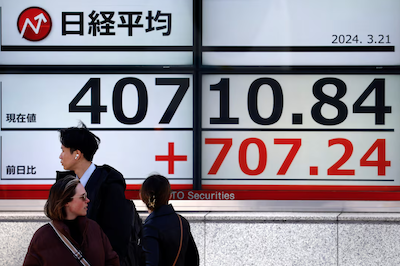Asia’s major stock indexes were in mixed trade on Tuesday as investors continued to assess the impact of the assassination attempt on US presidential candidate Donald Trump.
U.S. stocks closed higher on Monday as hopes of President Donald Trump’s reelection spurred hopes of deregulation that spilled over into Asian markets, while a slump in tech stocks spread to other markets on fears the U.S.-China trade war will escalate under Trump.
Japan’s Nikkei stock average rose slightly, tracking gains on Wall Street after markets were closed for a public holiday on Monday.
Also featured in AF: OpenAI’s “Strawberry” model is capable of “deep research”
Nikkei Stock Average The index rose 0.20 percent, or 84.40 points, to close at 41,275.08, while the TOPIX rose 0.34 percent, or 9.94 points, to close at 2,904.50.
Defense-related companies Mitsubishi Heavy Industries and Kawasaki Heavy Industries were the top gainers, rising 5% and 6.2%, respectively, as speculation of a Trump victory sparked the so-called “Trump trade.”
The market was also paying close attention to corporate performance, with many participants predicting that export companies would announce increased revenue amid the weakening yen.
The yen has strengthened against the dollar since Thursday, leading many to suspect Japan may have intervened to pull the currency out of a 38-year low.
Chinese stocks held firm amid weak economic data as investors waited for details of reform measures to be announced at the Third Plenary Session of the 19th Central Committee of the Communist Party of China. Hong Kong shares fell, dragged down by technology shares.
China’s economy slowed more than expected in the second quarter, as sluggish property prices and lingering employment uncertainty sapped momentum from a fragile recovery and prompted continued speculation that Beijing needed to roll out further stimulus measures.
The Shanghai Composite Index rose 0.08 percent, or 2.29 points, to 2,976.30, while the Shenzhen Composite Index on China’s second exchange rose 0.49 percent, or 7.80 points, to 1,611.80.
JD Vance Nominee
China’s blue-chip CSI 300 index rose 0.63%. In early trade, the financial sector sub-index was down 0.54%, the consumer staples sector was up 0.16%, the real estate index was up 1.74% and the healthcare sub-index was up 0.17%.
China H-shares (shares of mainland Chinese companies) listed in Hong Kong fell 1.34% to 6,335.88, Hang Seng Index It fell 1.60 percent or 287.96 points to close at 17,727.98.
Hong Kong-listed tech giants fell 1.7 percent, with shares in Ping An Insurance falling 5.4 percent after the company said it had raised $3.5 billion in convertible bonds.
Elsewhere in the region, Sydney, Singapore, Wellington and Jakarta also fell in early trading, while Seoul, Mumbai, Taipei and Manila posted small gains.
MSCI’s broadest index of Asia-Pacific shares ex-Japan fell 0.3%, extending Monday’s 0.3% loss.
European markets are expected to open lower, with Euro Stoxx 50 futures down 0.3%. S&P 500 futures up 0.2% and Nasdaq futures up 0.3%. Wall Street rose as dovish comments from the Federal Reserve boosted hopes of more interest rate cuts in the US this year.
Investors continued to digest the impact of Saturday’s shooting of former U.S. President Donald Trump, who on Monday named J.D. Vance as his running mate.
Dow Jones Records
Polls show a close race between President Trump and President Joe Biden, but President Trump has leads in several battleground states that are likely to decide the election.
The Dow Jones Industrial Average closed at a record high thanks to energy and bank stocks, bitcoin soared, gold rose toward an all-time high and the yield curve surged as investors embraced the so-called Trump victory trade.
Meanwhile, Fed Chairman Jerome Powell said on Monday that three U.S. inflation measures for the second quarter “provide some increased confidence” that inflation is returning sustainably to the Fed’s goal.
The market is now fully pricing in a quarter-point Fed rate cut in September, with a total of 68 basis points (bps) of cuts expected by the end of the year.
That capped gains for the U.S. dollar overnight, but renewed yen weakness on Tuesday helped it rise 0.1% against a basket of major currencies.
Longer-term government bonds gained ground in Asia, with the 10-year Treasury yield down 2 basis points to 4.2060%, having risen 4 basis points from the previous night.
Gold rose 0.3 percent to $2,428.67 an ounce, near a record high, while crude oil prices fell on concerns a slowing Chinese economy would weigh on demand.
main character
Tokyo – Nikkei Stock Average > Up 0.20% to 41,275.08 (closing price)
Hong Kong – Hang Seng Index < down 1.60% to 17,727.98 (closing price)
Shanghai Composite Index > up 0.08% to 2,976.30 (closing price)
London – FTSE 100 down < 0.43% to 8,148.16 (0935 BST)
New York – Dow > up 0.53% to 40,211.72 (Monday close)
- Additional editing by Sean O’Meara, Reuters
read more:
Factory closures and cheap Chinese imports shake Thailand’s economy
Hang Seng Index falls on Trump concerns, Chinese stocks rise on stimulus hopes
China’s new home prices fall at fastest pace since 2015
China’s second-quarter growth slows, hit by weak retail sales
Conflicting goals could limit China’s General Assembly success

